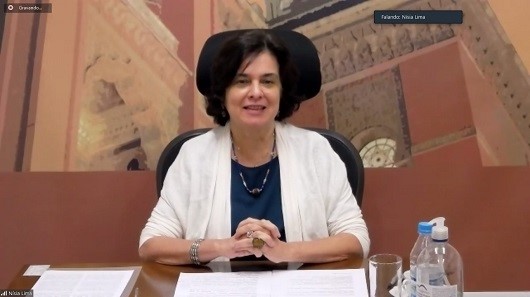A long-standing collaborative relationship between the Oswaldo Cruz Foundation (Fiocruz) and the UNICEF/UNDP/World Bank/WHO Special Programme for Research and Training in Tropical Diseases (TDR) was formalized with the signing of a Memorandum of Understanding (MoU).
The document, which establishes the terms of technical cooperation to combat neglected tropical diseases, was signed during a virtual meeting between President Nísia Trindade Lima and John Reeder, Director of TDR. The event also noted the election of the Foundation to TDR’s Joint Coordinating Board in June.
Five-year plan
The new workplan outlined in the MoU for the next five years includes the adaptation to Portuguese of the Implementation Research Toolkit and the Massive open online course (MOOC) on implementation research. Other plans include establishment of a network linking TDR and Fiocruz with ministries of health in Portuguese-speaking countries; collaboration on research on snakebite; and the promotion of technical cooperation in Latin America through the ESSENCE on Health Research initiative.
For Dr Trindade Lima, the signing of the memorandum aligns with the tripod on which Fiocruz is based: science, health and education. "The memorandum and election of Fiocruz to the Board create conditions for a more integrative and global view of our fields of activity, taking into account the needs of neglected populations," she said. "This event signals the meeting of science with health and the engagement of populations."
She believes that virtual research training activities should also be expanded through the partnership and stressed its importance to new researchers. "Learning in research is not limited to our training courses."

Fiocruz President Nísia Trindade Lima during the virtual signing ceremony for the Memorandum of Understanding.
Fiocruz has a long history of working with TDR through a number of WHO Collaborating Centres: for Global Health and South-South Cooperation; Environmental and Public Health; Leptospirosis; Pharmaceutical Policy; and Education of Health Technicians, in addition to other activities.
Dr Garry Aslanyan, Partnerships and Governance Manager at TDR, recalled that this memorandum is the result of a relationship "that has solidified over the years. Many experts at Fiocruz already work or collaborate with TDR.”
Dr Carlos Morel, General Coordinator of the Center for Technological Development in Health (CDTS/Fiocruz), led TDR as Director from 1998 to 2003, and Dr Rodrigo Corrêa-Oliveira, Vice President for Research and Biological Collections, represented Brazil at the Joint Coordinating Board from 2006 to 2011 and in 2018.
The relationship between neglected tropical diseases and social inequalities was also highlighted. "That's why, at Fiocruz, we are increasingly talking about neglected populations, more than neglected diseases," Dr Trindade Lima said.
Dr Paulo Buss, Coordinator of the Center for International Relations in Health at Fiocruz, recalled that the Foundation brings important assets to this partnership. One of them is the Network of National Institutes of Public Health of the Community of Portuguese-speaking Countries, whose technical secretariat is located at Fiocruz. In addition, the secretariats of the Network of National Institutes of Public Health in Latin America and the Caribbean and the Ibero-American Network of National Institutes of Public Health, including Portugal and Spain, are also hosted at Fiocruz.
Cristina Alexandre, special adviser to the Ministry of Health for International Affairs, linked the fight against neglected diseases to the 2030 Agenda for Sustainable Development, with the need to promote health and well-being, "without leaving anyone behind. We know that this cooperation is important," she said.
Science under the spotlight
For Dr Reeder, the signature of the memorandum will give a new impetus to the relationship. He advocated the need for implementation research as a way of helping to achieve universal health coverage through implementation of actions "that we know can work but do not work."
Dr Reeder also stressed the need to strengthen research capacity through training as well as global engagement. "Solid learning and capacity building in countries is the best guarantee that they will be able to respond to emergencies that arise tomorrow," he said. And he recalled that with the COVID-19 pandemic, science is in the spotlight. "When in the past have chief scientists appeared on the front page of newspapers? People are paying attention to data and science. We can't let that get lost," he said.
For more information, please contact Dr Garry Aslanyan.

